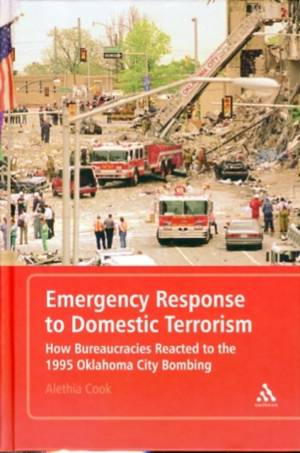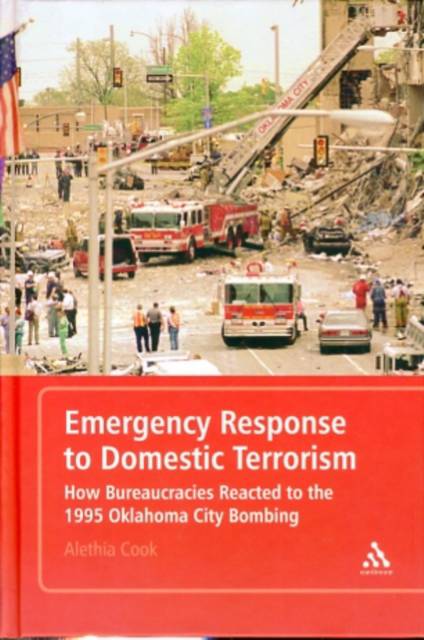
- Retrait gratuit dans votre magasin Club
- 7.000.000 titres dans notre catalogue
- Payer en toute sécurité
- Toujours un magasin près de chez vous
- Retrait gratuit dans votre magasin Club
- 7.000.0000 titres dans notre catalogue
- Payer en toute sécurité
- Toujours un magasin près de chez vous
Emergency Response to Domestic Terrorism
How Bureaucracies Reacted to the 1995 Oklahoma City Bombing
Alethia H Cook
Livre relié | Anglais
322,45 €
+ 644 points
Description
Emergency Response to Domestic Terrorism analyzes the emergency response to the bombing of the Alfred P. Murrah Federal Building in Oklahoma City on April 19, 1995.
Terrorism is a complex threat, and the American government is expected to deter or intervene in every attack. For that reason, the government must be better prepared to respond to acts of terror. One critical element is to understand what constitutes an "effective response."
To answer this key question, the author examined the existing literature and interviewed thirty-one elite participants in the emergency response to the bombing. The result is a unique qualitative case study that analyzes the response efforts undertaken after the bombing to draw conclusions about their relative success or failure.
Emergency Response to Domestic Terrorism looks at the nature and interrelationship of bureaucratic structures involved in the response, the organizational networking between the response bureaucracy, and the impact of bureaucratic culture on the response.
The work contributes to the existing literatures in both emergency response and bureaucracy. First, theoretical arguments about bureaucracies and their function are put to the test as they are applied to a specific crisis situation. Second, interview materials with key individuals who were on the scene of this American terrorist disaster are provided. Third, the emergency response literature is examined to determine whether the Oklahoma City bombing exhibited the anticipated response challenges. In addition, the work provides insights into the extent to which response communities are familiar with federal response guidelines. The overall results of the study are applicable to emergency response to terrorist incidents and to natural disasters.
By bringing together the academic and the practical aspects of emergency response, the work will appeal to students, practitioners, and policymakers. Further, it will foster better understanding of public policy and public administration in general.
Terrorism is a complex threat, and the American government is expected to deter or intervene in every attack. For that reason, the government must be better prepared to respond to acts of terror. One critical element is to understand what constitutes an "effective response."
To answer this key question, the author examined the existing literature and interviewed thirty-one elite participants in the emergency response to the bombing. The result is a unique qualitative case study that analyzes the response efforts undertaken after the bombing to draw conclusions about their relative success or failure.
Emergency Response to Domestic Terrorism looks at the nature and interrelationship of bureaucratic structures involved in the response, the organizational networking between the response bureaucracy, and the impact of bureaucratic culture on the response.
The work contributes to the existing literatures in both emergency response and bureaucracy. First, theoretical arguments about bureaucracies and their function are put to the test as they are applied to a specific crisis situation. Second, interview materials with key individuals who were on the scene of this American terrorist disaster are provided. Third, the emergency response literature is examined to determine whether the Oklahoma City bombing exhibited the anticipated response challenges. In addition, the work provides insights into the extent to which response communities are familiar with federal response guidelines. The overall results of the study are applicable to emergency response to terrorist incidents and to natural disasters.
By bringing together the academic and the practical aspects of emergency response, the work will appeal to students, practitioners, and policymakers. Further, it will foster better understanding of public policy and public administration in general.
Spécifications
Parties prenantes
- Auteur(s) :
- Editeur:
Contenu
- Nombre de pages :
- 136
- Langue:
- Anglais
Caractéristiques
- EAN:
- 9780826462657
- Date de parution :
- 02-11-09
- Format:
- Livre relié
- Format numérique:
- Ongenaaid / garenloos gebonden
- Dimensions :
- 155 mm x 229 mm
- Poids :
- 317 g

Les avis
Nous publions uniquement les avis qui respectent les conditions requises. Consultez nos conditions pour les avis.






